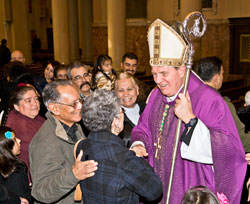Parish family says native son was instrumental in building community

After celebrating Mass at his home parish, Holy Redeemer Church in Detroit, on Nov. 25, 2010, Archbishop Joseph W. Tobin stands in the church’s main aisle greeting parishioners for more than a half-hour. Archbishop Tobin was baptized at the church and was its pastor for several years after being ordained a priest. (Photos by Larry A. Peplin, The Michigan Catholic)
By Tim Keenan (Special to The Criterion)
DETROIT—Catholic tradition dictates that when a bishop comes to a new diocese, it becomes his home.
That will certainly be the case for Archbishop Joseph W. Tobin in central and southern Indiana, but he will always have strong roots in his native Detroit.
Born on May 3, 1952, in the Motor City, the oldest of 13 children in a good Irish-Catholic family, Archbishop Tobin was baptized five days later in the baptistery of Holy Redeemer Church on the city’s southwest side.
The huge Romanesque church, reminiscent both inside and out of an Italian basilica, would play a large part in the prelate’s life before and after his ordination as a Redemptorist priest.
Archbishop Tobin’s Redemptorist order was responsible for the aptly named parish for more than 100 years until 1999. That influence certainly shaped him as he attended Holy Redeemer School from 1958 to 1966 before starting on his path to becoming a Redemptorist priest.
Shortly after his ordination, Father Joseph returned to Holy Redeemer Parish in 1979 to become associate pastor of his home parish, which also served as a regional Redemptorist headquarters.
From 1984 to 1990, he served as pastor of the parish whose neighborhood had become predominantly Hispanic.
Rather than ignore the changing demographics, Father Joseph initiated pastoral service to the Hispanic community.
“There was a big change at Holy Redeemer [Parish] when the Hispanic people came in,” recalled Mary Kraatz, 92, a lifelong Holy Redeemer parishioner. “He was an excellent pastor for the Hispanics, integrating them into the church. And he was very good in dealing with the rest of us, including some of whom weren’t as accepting.”
Marie Ross, 69, Holy Redeemer’s former office manager, recalls those days of change very well.
“His knowing five languages made the Hispanic people feel very welcome because he was so fluent,” Ross said. “They said he spoke Spanish better than some of the native Spanish speakers.
“He was instrumental in bringing the Spanish and English speakers together,” she said. “At the time, we had Masses in the basement for Spanish speakers, and he made it comfortable for them to join in with the rest of the parish.”
During a visit to the church in 2010, Archbishop Tobin told The Michigan Catholic of those changing times at Holy Redeemer. “We had a clear sense of mission at Holy Redeemer, and the opportunity to share that sense of mission with my fellow Redemptorists and the sisters, Servants of the Immaculate Heart of Mary.”
Although he moved on to national and international positions, the archbishop said he always keeps up with news of his home parish and of Detroit, “of both its struggles and victories.”
Maria Iglesias, a longtime member of Holy Redeemer Parish, told The Michigan Catholic during that 2010 visit, “I adored that priest. He gave the best homilies. They hit your heart, and you would wish he would never finish. He was a very humble person with a lot of humanity for the poor, and he loved the Hispanic people at Holy Redeemer.”
Parishioner Maria Socorro Hernandez, through an interpreter, said, “He knew the people by their name and made us feel that we were all welcomed in the church. He helped many people in need, and was loved very much by the parish.”
By all accounts, Archbishop Tobin is remembered fondly at his home church where he was baptized, educated, became aware of the order to which he ultimately professed and eventually was appointed the pastor.
Kraatz credits his family life for placing him on the path to priesthood and beyond.
“His mother was right behind me at Holy Redeemer High School, and I knew his aunts,” said Kraatz. “My father and his grandfather were ushers at Holy Redeemer for years. Many times we got together at [the Tobin] house on Campbell Street and did things for Holy Redeemer. I really enjoyed it. They were a very faithful family.”
Of her one-time neighbor and pastor, Kraatz said, “He’s a good Irishman and has a very nice manner. He’s receptive to other people and has a wonderful sense of humor.”
Asked about her lasting memory of Archbishop Tobin, Kraatz said, “His openness and his willingness to embrace change. He’s going to do a good job in [the Archdiocese of] Indianapolis, and I’m glad he’s going to be closer to his family.”
Ross, recalling her time as the former office manager, said his personality made him a successful priest and pastor, and will serve him well as archbishop.
“He has a great personality, dynamic in fact,” she said. “People love him because he is so easy to talk to. When you talk to him, he makes you feel like you are the most important person at that moment.”
Ross recalled that sometimes it was difficult to find him for meetings because he was busy helping someone.
“You had an inkling that there would be great things coming down the pike for him,” she said. “He has that personality that just gathers people.”
Ross said she visited the archbishop in Rome not long ago and remembers “not thinking of him as an archbishop. You think of him as Father Joe.”
(Tim Keenan is a freelance writer based in Farmington Hills, Mich. He is a regular contributor to The Michigan Catholic, newspaper of the Archdiocese of Detroit.) †
